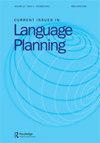实践中的基层决策:通过代理、行动主义和替代声音,将传统语言纳入关键联系项目
IF 1.8
1区 文学
Q2 EDUCATION & EDUCATIONAL RESEARCH
引用次数: 0
摘要
本文从语言政策和规划(LPP)的角度审视了关键联系多语言数字故事讲述项目,并在语言教育政策中考虑了传统语言学习的情况。我们将我们的项目视为实践中的基层决策,并展示了通过深入而有意义的合作,研究人员、教师、家长/看护人和学生如何行使自下而上的代理权,以解决学习语言和发展多语言素养的关键问题。我们的跨学科方法将跨文化嵌入语言学习过程的各个阶段,创造空间,培养同理心、积极的公民意识,并为更可持续的未来创造可能性。我们询问了我们的批判性连接项目,并认为这种LPP方法提供了一种以跨文化为导向的批判性世界主义教育的替代模式,它验证了多语言身份。我们展示了数字技术、虚拟社区和对社会正义日益增长的关注如何塑造了该项目,并讨论了我们如何采用批判性的人种学方法。在研究我们项目的目的、原则和方法时,数字故事本身被分析并作为充满活力的数据呈现。最后,我们专门探讨了我们对遗产语言和LPP的研究所带来的影响。最后,我们对遗产语言规划和政策提出了一系列建议。本文章由计算机程序翻译,如有差异,请以英文原文为准。
Grassroots policymaking in practice: including heritage languages in the critical connections project through agency, activism, and alternative voices
This article examines the Critical Connections Multilingual Digital Storytelling Project through the lens of Language Policy and Planning (LPP) and considers the situation of heritage language learning within the policy on language education. We present our project as grassroots policymaking in practice and demonstrate how, through deep and meaningful collaboration, researchers, teachers, parents/carers, and students can exercise bottom-up agency to address key issues in learning languages and developing multilingual literacy. Our interdisciplinary approach embeds interculturality within all stages of the language learning process creating spaces that foster empathy, activist citizenship, and possibilities for a more sustainable future. We interrogate our Critical Connections Project and argue that this approach to LPP provides an alternative model of interculturally oriented critical cosmopolitan education which validates multilingual identities. We show how digital technology, virtual communities, and a growing concern for social justice have shaped the project and discuss how we adopted a critical ethnographic approach. In looking at purposes, principles and means in our project, the digital stories themselves are analysed and presented as vibrant data. To conclude, we engage speci fi cally with the implications of our research for heritage languages and LPP. Finally, we make a series of recommendations for heritage language planning and policy.
求助全文
通过发布文献求助,成功后即可免费获取论文全文。
去求助
来源期刊

Current Issues in Language Planning
Multiple-
CiteScore
4.80
自引率
16.70%
发文量
26
期刊介绍:
The journal Current Issues in Language Planning provides major summative and thematic review studies spanning and focusing the disparate language policy and language planning literature related to: 1) polities and language planning and 2) issues in language planning. The journal publishes four issues per year, two on each subject area. The polity issues describe language policy and planning in various countries/regions/areas around the world, while the issues numbers are thematically based. The Current Issues in Language Planning does not normally accept individual studies falling outside this polity and thematic approach. Polity studies and thematic issues" papers in this journal may be self-nominated or invited contributions from acknowledged experts in the field.
 求助内容:
求助内容: 应助结果提醒方式:
应助结果提醒方式:


